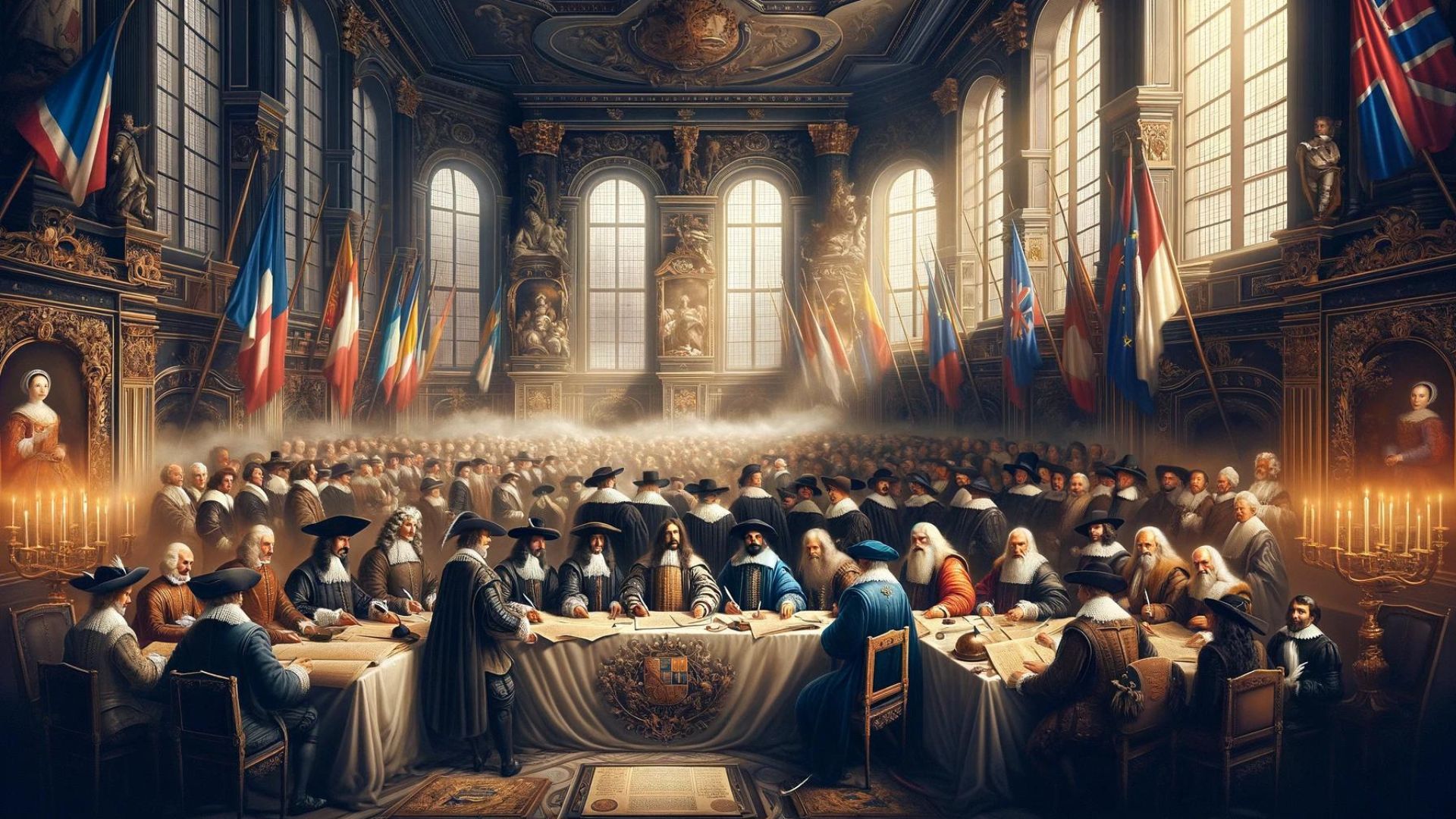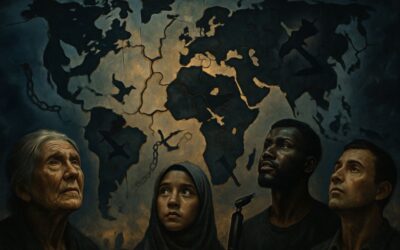- A Glimmer of Hope Amidst Chaos: The Thirty Years’ War
- The Birth of Peace: The Treaty of Westphalia
- Lessons Learned: The Possibility of Peace Against All Odds
- Taking Action: Embracing the Spirit of Peace
- Action Point: Be a Peacemaker
- Why Should You Care?
- Key Takeaways
- Keywords and Definitions
- Frequently Asked Questions
- Myth Buster
- Let’s Talk: Discussion Questions
Prepare to be inspired as we journey through the remarkable tale of the Treaty of Westphalia—a shining example of peace prevailing against all odds, even in the darkest of times. In the tumultuous aftermath of the Thirty Years’ War, this historic agreement emerged as a beacon of hope, offering valuable insights into the possibility of peace, even when it seems impossible.
A Glimmer of Hope Amidst Chaos: The Thirty Years’ War
The Thirty Years’ War, a devastating conflict that ravaged Europe from 1618 to 1648, left a trail of destruction and despair in its wake. Fueled by religious strife, political ambitions, and territorial disputes, this brutal war seemed to have no end in sight, plunging entire nations into chaos and despair.
Real-Life Example: Consider the ongoing conflicts in regions such as the Middle East or Africa, where sectarian tensions, political rivalries, and territorial disputes continue to fuel violence and bloodshed, leaving countless lives shattered in their wake.
The Birth of Peace: The Treaty of Westphalia
Amidst the chaos of war, a glimmer of hope emerged in the form of the Treaty of Westphalia. Signed in 1648, this historic agreement brought an end to the Thirty Years’ War and reshaped the political landscape of Europe. By recognizing the sovereignty of individual states and promoting the principle of religious tolerance, the Treaty of Westphalia laid the groundwork for a new era of peace and cooperation.
Real-Life Example: Reflect on instances where diplomatic negotiations and peace agreements have brought an end to longstanding conflicts, such as the Oslo Accords in the Middle East or the Good Friday Agreement in Northern Ireland, demonstrating the power of dialogue and compromise in resolving disputes.
Lessons Learned: The Possibility of Peace Against All Odds
The Treaty of Westphalia offers valuable lessons for fostering peace in today’s world, demonstrating that even in the midst of seemingly insurmountable challenges, peace is possible. By embracing principles such as diplomacy, dialogue, and compromise, nations can overcome deep-rooted divisions and work towards a brighter, more peaceful future for all.
Real-Life Example: Consider the recent peace talks between North and South Korea, which have led to significant progress in reducing tensions and promoting reconciliation on the Korean Peninsula, despite decades of conflict and animosity.
Taking Action: Embracing the Spirit of Peace
As we reflect on the remarkable legacy of the Treaty of Westphalia, let us be inspired to take action in our own lives to promote peace and understanding. Whether through acts of kindness, fostering dialogue in our communities, or advocating for peaceful resolutions to conflicts, each of us has the power to make a difference and contribute to a more peaceful world.
Action Point: Be a Peacemaker
Take a moment to reflect on how you can embody the spirit of peace in your own life and community. Whether it’s reaching out to someone in need, engaging in constructive dialogue with those who hold different viewpoints, or supporting organizations dedicated to peacebuilding efforts, let your actions be a beacon of hope in a world often overshadowed by conflict and discord.
As we conclude our journey through the remarkable story of the Treaty of Westphalia, let us carry with us the timeless lessons it imparts. May we be inspired by the triumph of peace over war, and may we each play our part in fostering understanding, compassion, and reconciliation in our world. Together, let us dare to believe in the possibility of peace, even when it seems most elusive, and work tirelessly to make that dream a reality for generations to come.
Why Should You Care?
Understanding the Treaty of Westphalia and its significance is vital because it provides valuable insights into the possibility of peace, even in the face of seemingly insurmountable challenges. By learning about this historic agreement, individuals gain a deeper appreciation for the power of diplomacy, dialogue, and compromise in resolving conflicts and fostering reconciliation. Moreover, studying the Treaty of Westphalia inspires hope and encourages individuals to take action in promoting peace and understanding in their own lives and communities.
Key Takeaways
- The Treaty of Westphalia, signed in 1648, ended the devastating Thirty Years’ War in Europe and reshaped the political landscape of the continent.
- Despite the chaos and despair of war, the Treaty of Westphalia emerged as a beacon of hope, demonstrating the possibility of peace through diplomacy and compromise.
- The principles of sovereignty and religious tolerance promoted by the Treaty of Westphalia laid the groundwork for a new era of peace and cooperation among European nations.
- The legacy of the Treaty of Westphalia serves as a reminder of the enduring importance of dialogue, diplomacy, and reconciliation in resolving conflicts and building a more peaceful world.
Keywords and Definitions
- Treaty of Westphalia: A series of peace agreements signed in 1648, ending the Thirty Years’ War in Europe and reshaping the political landscape of the continent.
- Thirty Years’ War: A devastating conflict that ravaged Europe from 1618 to 1648, fueled by religious strife, political ambitions, and territorial disputes.
- Diplomacy: The practice of conducting negotiations and maintaining relations between nations, often aimed at resolving conflicts and promoting cooperation.
- Dialogue: A process of communication and exchange of ideas between individuals or groups, with the goal of fostering understanding and reaching mutual agreements.
- Compromise: The act of reaching a settlement or agreement by making concessions or finding middle ground between conflicting parties.
- Sovereignty: The supreme authority and independence of a state or government, allowing it to govern its own affairs without interference from external powers.
- Religious Tolerance: The acceptance and respect for the beliefs and practices of different religious groups, allowing individuals to coexist peacefully despite differences in faith.
- Reconciliation: The process of restoring friendly relations between individuals or groups after a period of conflict or disagreement, often through acknowledgment of past grievances and forgiveness.
- Hope: A feeling of optimism and expectation for a positive outcome, even in challenging or difficult circumstances.
- Action: The act of taking steps or measures to achieve a desired goal or bring about change, often motivated by a sense of purpose or responsibility.
Frequently Asked Questions
What were the main provisions of the Treaty of Westphalia?
The Treaty of Westphalia recognized the sovereignty and territorial integrity of individual states, promoted religious tolerance, and established the principle of diplomatic immunity. It also granted certain rights to religious minorities and formalized the balance of power in Europe.
How did the Treaty of Westphalia impact the political landscape of Europe?
The Treaty of Westphalia marked the end of the Holy Roman Empire’s dominance in Europe and contributed to the rise of nation-states. It also led to the emergence of a system of sovereign states, paving the way for the modern state system.
What role did diplomacy play in the negotiation of the Treaty of Westphalia?
Diplomacy played a crucial role in the negotiation of the Treaty of Westphalia, as representatives from various European powers engaged in extensive diplomatic discussions to reach a consensus on key issues. Diplomats utilized negotiation tactics, compromise, and dialogue to overcome differences and forge a lasting peace agreement.
Did the Treaty of Westphalia achieve lasting peace in Europe?
While the Treaty of Westphalia brought an end to the Thirty Years’ War and established a framework for peace in Europe, it did not eliminate all sources of conflict. Tensions and disputes continued to arise among European powers in the centuries that followed, highlighting the ongoing challenges of maintaining peace and stability in the region.
Myth Buster
Myth: The Treaty of Westphalia solved all of Europe’s problems and ensured lasting peace on the continent.
Reality: While the Treaty of Westphalia brought an end to the Thirty Years’ War and reshaped the political landscape of Europe, it did not eliminate all sources of conflict. Tensions and rivalries persisted among European powers, leading to future conflicts and wars.
Let’s Talk: Discussion Questions
- How do you think the principles of sovereignty and diplomacy promoted by the Treaty of Westphalia could be applied to resolving contemporary conflicts?
- What lessons can be learned from the negotiation process of the Treaty of Westphalia in terms of fostering dialogue and compromise in conflict resolution?
- How can individuals and communities promote peace and reconciliation in their own lives, drawing inspiration from the legacy of the Treaty of Westphalia?
- Share your thoughts on the significance of the Treaty of Westphalia in shaping the modern world and its relevance to current global challenges.










0 Comments